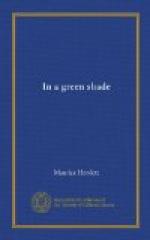Fanny herself, there are two simple reasons why it
could not. First, she was writing her journal
for the entertainment of old Mr. Crisp of Chessington,
the “Daddy Crisp” of her best pages; secondly,
it is not at all likely that she knew of anything
to unfold. Nor, for that matter, was Fanny herself
of the kind that can unfold to another person.
Yet there is a charm all over the book, which some
may place here, some there, but which all will confess.
For me it is not so much that Fanny herself is a charming
girl, and a girl of shrewd observation, of a pointed
pen, and an admirable gift of mimicry. She has
all that, and more—she has a good heart.
Her sister Susan is as good as she, and there are many
of Susan’s letters. But the real charm
of the book, I think, is in the series of faithful
pictures it contains of the everyday round of an everyday
family. Dutch pictures all—passers-by,
a knock at the front door, callers—Mr.
Young, “in light blue embroidered with silver,
a bag and sword, and walking in the rain”; a
jaunt to Greenwich, a concert at home—the
Agujari in one of her humours; a masquerade—a
very private one, at the house of Mr. Laluze....
Hetty had for three months thought of nothing else
... she went as a Savoyard with a hurdy-gurdy fastened
round her waist. Nothing could look more simple,
innocent and pretty. “My dress was a close
pink Persian vest covered with a gauze in loose pleats....”
What else? Oh, a visit to Teignmouth—Maria
Allen now Mrs. Ruston; another to Worcester; quiet
days at King’s Lynn, where “I have just
finished
Henry and Frances ... the greatest
part of the last volume is wrote by Henry, and on
the gravest of grave subjects, and that which is most
dreadful to our thoughts, Eternal Misery....”
Terrific novel: but need I go on? There
may be some to whom a description of the nothings of
our life will be as flat as the nothings themselves—but
I am not of that party. The things themselves
interest me, and I confess the charm. It is the
charm of innocence and freshness, a morning dew upon
the words.
The Burneys, however, can do no more for us than shed
that auroral dew. They cannot reassure us of
our normal humanity, since they needed reassurance
themselves.
Where, then, shall we turn? So far as I am aware,
to two only, except for two others whom I leave out
of account. Rousseau is one, for it is long since
I read him, but my recollection is that the Confessions
is a kind of novel, pre-meditated, selective, done
with great art. Marie Bashkirtseff is another.
I have not read her at all. Of the two who remain
I leave Pepys also out of account, because, though
it may be good for us to read Pepys, it is better
to have read him and be through with it. There,
under the grace of God, go a many besides Pepys, and
among them every boy who has ever befouled a wall with
a stump of pencil. We are left then with one
whom it is ill to name in the same fill of the inkpot,
“Wordsworth’s exquisite sister,”
as Keats, who saw her once, at once knew her to be.




